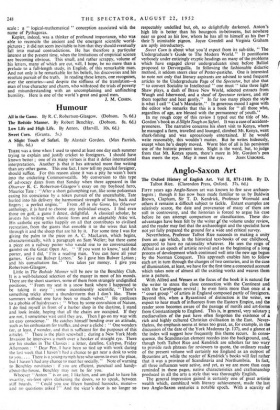Humour
Sweet Corn. (Granta. 5s.)
THERE was a time when I used to spend at least one day each summer trying to explain and justify cricket to foreigners. I should have known better ; one of its many virtues is that it defies international interpretation. Another is that it has attracted more fine writing than any other game. This one fact, I now tell my puzzled foreigner, should suffice. For this reason alone it was a pity he wasn't born into the cricketing Commonwealth. My conversion to this type of advocacy dates from that Sunday when there appeared in the Observer R. C. Robertson-Glasgow's essay on my boyhood hero, Maurice Tate : "After a short galumphing run, like some policeman easing his conscience by a token pursuit of the uncatchable, Tate hurled into his delivery the harmonised strength of loins, back and fingers ; a perfect engine." From All in the Game, his Observer anthology, it is hard to choose any individual essays. I find even those on golf, a game I detest, delightful. A classical scholar, he invests his writing with classic form and an adaptably Attic wit. His catholic eye settles happily on all that contributes to civilised recreation, from the giants that ennoble it to the wives that knit through it and the sheep that are hit by it. For some time I was for giving the palm to the piece on A. C. MacLaren, which begins, characteristically, with a paragraph on Sam Weller; but there came a piece on a railway porter who would rise to no conversational gambit on the Great Open Air. " 'If you want to know,' said the porter, and I did, ' 'm a reading man. You can have all your games. Give me Bulwer Lytton.' So I gave him Bulwer Lytton ; and his consultation fee." You takes yer money. I give you Robertson-Glasgow.
Little in The Bedside Manner will be new to the Benchley Club. It is a well-balanced selection of the master in most of his moods. There are the short saunters, some of them from strangely undignified positions, " From my seat in a snow bank where I happened to be taking it easy " ; some incontinently scientific, " There's something tricky about a thunderstorm that I don't like. Three summers without one have been so much velvet." He confesses to a phobia of hairdressers : " When by some convulsion of Nature, I do find myself in front of a barber shop in the daytime, I stand and look inside, hoping that all the chairs are occupied. If they are not, I sometimes wait until they are. Then I go on my way with an easy conscience." He catches himself bending over an attitude, such as his enthusiasm for truffles, and over a cliché : " One wonders (or, at least, I wonder, and that is sufficient for the purposes of this article). " There is the plain screwball ; during a New York Moth Invasion he interviews a moth over a hooker of straight rye. There are his studies in The Classics : a letter, dateline, Calypso, Friday Afternoon : " Dear Pen, I have been so tied up with work during the last week that I haven't had a chance to get near a desk to write to you. . . . There is a young nymph here who seems to own the place, but I haven 't had any chance to meet her socially." Note of warning to Benchley novitiates : if you are efficient, punctual and handy- about-the-house, Benchley may not be for you.
Whoever Anton " is or are, I like him, and am glad to have his swarthy, six-foot spivs darkening the doors, so to speak, between still' boards. " Could you use fifteen hundred hassocks, mister— and no questions asked ?" And the vicar's door is no longer so respectably undefiled but, oh, so delightfully darkened. Anton's high life is better than his bourgeois in-betweens, but nowhere near so good as his low, whom he has all to himself as his (her ? their ?) inimitable pigeon. Joyce Grenfell and Virginia Graham are aptly introductory.
Sweet Corn is about what you'd expect from its sub-title, " The Undergraduate's Guide to The Modern World." It pontificates verbosely under enticingly cryptic headings on many of the problems which have engaged clever undergraduates since before Balliol proposed to Dervorguilla. In following the fashionable didactic method, it seldom steers clear of Potter-pastiche. One is interested to note not only that literary aspirants are advised to send frequent articles to the Undergraduate Page of the Spectator, but also that " to convert Socialite to Intellectual " one must " take three light Shaw plays, a dash of Brave New World, selected extracts from Waugh and Isherwood; and a sheaf of Spectator reviews, and stir them together and heat gently." In far too many places the style is what I call " Cad's Mandarin." In generous mood I agree with the editor who remarks that this is a book for " all those who, regardless of age, are blessed with the permanency of youth."
In my rough copy of this review I typed out the title of Mr. Gordon's book as A Slight Tough on Safari. It was a case of accident- proneness. The narrative concerns his short visit to Kenya, where he managed a farm, travelled and lounged, climbed Mt. Kenya, went shark-fishing and was uproariously entertained. If he would write reasonably, this wouldn't matter. But he writes hideously, except when he's deeply moved. Worst blot of all is his persistent use of the historic present tense. Slight is the word, but, to judge from that Mt. Kenya spasm, there's more in Mr. Gordon's pen
than meets the eye. May it meet the eye. JOHN USBORNE.


























 Previous page
Previous page